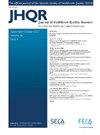内科值班期间关于生命终结的伦理决定
IF 1
Q4 HEALTH CARE SCIENCES & SERVICES
引用次数: 0
摘要
目的描述在当值期间,医生未知的患者决定停止和撤销维持生命治疗和姑息性镇静的频率。方法对西班牙内科医师进行观察性研究(调查)。结果273项调查。在他们不认识的患者中,95.2%的患者在随叫随到时决定是否应该进入重症监护病房,89%的患者决定是否开始镇静。最被确定为“侵略性”的措施:入住重症监护病房、使用侵入性技术、心肺复苏和侵入性治疗。48.4%的医生是作为团队决定开始镇静的,10人中有4人没有咨询患者。癌症患者(73%)、心力衰竭患者(60.4%)和慢性阻塞性肺疾病患者(58%)最常计划做决定。结论:在值班期间,几乎所有内科医生都要决定是否将病人送进重症监护室或是否给未知病人注射镇静剂。癌症患者的决定更多是计划好的。镇静的决定通常是由一个团队做出的,通常不征求病人的意见。本文章由计算机程序翻译,如有差异,请以英文原文为准。
Ethical decisions on the end of life during internal medicine on-call shifts
Objectives
To describe the frequency of decisions of withholding and withdrawing life-sustaining treatment and palliative sedation in patients previously unknown to physicians during on-call.
Methods
Observational study (survey) of Spanish internists.
Results
Two hundred seventy-three surveys. In patients they did not know, 95.2% decided during an on-call whether they should enter the Intensive Care Unit and 89% whether to initiate sedation. Measures most identified as “aggressive”: admission to the Intensive Care Unit, use of invasive techniques, cardiopulmonary resuscitation and invasive treatments. 48.4% make the decision to start sedation as a team and 4 out of 10 do not consult the patient. Decisions are planned most commonly with cancer patients (73%), with heart failure (60.4%) and chronic obstructive pulmonary disease (58%).
Conclusions
During the on-call, almost all internists make decisions about admission to the Intensive Care Unit or about sedation in unknown patients. It is planned more the decisions with cancer patients. The decision to sedate is usually made as a team and the patient is often not consulted.
求助全文
通过发布文献求助,成功后即可免费获取论文全文。
去求助
来源期刊

Journal of Healthcare Quality Research
Medicine-Health Policy
CiteScore
1.70
自引率
8.30%
发文量
83
审稿时长
57 days
期刊介绍:
Revista de Calidad Asistencial (Quality Healthcare) (RCA) is the official Journal of the Spanish Society of Quality Healthcare (Sociedad Española de Calidad Asistencial) (SECA) and is a tool for the dissemination of knowledge and reflection for the quality management of health services in Primary Care, as well as in Hospitals. It publishes articles associated with any aspect of research in the field of public health and health administration, including health education, epidemiology, medical statistics, health information, health economics, quality management, and health policies. The Journal publishes 6 issues, exclusively in electronic format. The Journal publishes, in Spanish, Original works, Special and Review Articles, as well as other sections. Articles are subjected to a rigorous, double blind, review process (peer review)
 求助内容:
求助内容: 应助结果提醒方式:
应助结果提醒方式:


